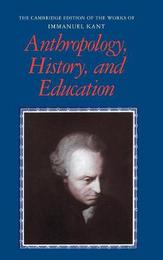
|
Anthropology, History, and Education
Hardback
Main Details
Description
Anthropology, History, and Education, first published in 2007, contains all of Kant's major writings on human nature. Some of these works, which were published over a thirty-nine year period between 1764 and 1803, had never before been translated into English. Kant's question 'What is the human being?' is approached indirectly in his famous works on metaphysics, epistemology, moral and legal philosophy, aesthetics and the philosophy of religion, but it is approached directly in his extensive but less well-known writings on physical and cultural anthropology, the philosophy of history, and education which are gathered in the present volume. Kant repeatedly claimed that the question 'What is the human being?' should be philosophy's most fundamental concern, and Anthropology, History, and Education can be seen as effectively presenting his philosophy as a whole in a popular guise.
Author Biography
Robert B. Louden is Professor of Philosophy at the University of Southern Maine. He is editor of Kant: Anthropology from a Pragmatic Point of View (2006). Gunter Zoeller is Professor of Philosophy at the University of Munich. He is editor of Fichte: The System of Ethics (2005).
Reviews"...The essays assembled in this collection present us with Kant's most direct and encompassing characterizations of human nature and are therefore essential reading for a deeper and more complete understanding of his moral philosophy.... The anthropological dimension of Kant's thought is too often neglected. The essays assembled in this collection are essential reading for remedying this deficiency, and they will inevitably challenge us to (re)consider the merit of Kant's account of the human position below the starry heavens above." -- Chris Henry McTavish, Athabasca University, Philosophy in Review
|